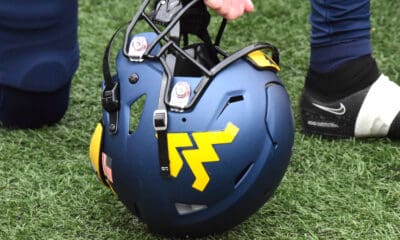WVU Basketball
WVU Basketball Coaches, Players Disappointed With Recent Defensive Effort

When the No. 17 West Virginia University men’s basketball team transitioned to a using four-shooters, one-forward lineup last month, the focus at the time was centered around how the Mountaineers’ offense would adjust.
In seven games since making that change, West Virginia’s offense has improved its scoring average, from 74.6 points per game to 77.3, but, at the same time, its defense has regressed badly, from 67.5 points allowed per game to 74.6.
WVU’s schematic change came when sophomore forward Oscar Tshiebwe left the program on New Year’s Day. Before, the Mountaineers had used two forwards in the paint, Tshiebwe and junior Derek Culver. Now, WVU uses four shooters outside the 3-point line with just Culver playing inside. It gives the Mountaineers more space to operate on offense but also gives opponents better lanes to the basket.
As WVU coach Bob Huggins tells it, however, the Mountaineers’ regression on defense has less to do with what scheme they are running and more with their attitude.
“I think you have to care,” Huggins said after Tuesday’s win at Iowa State. “You have to care about your man scoring on you, I think you have to care about not helping your teammate by not making a rotation, I think you have to care about not blocking somebody out. We get ahead and we just stand around.”
On Tuesday, West Virginia had built up a 15-point second-half lead over ISU, but let it slip away as the Cyclones had a chance to tie the game with less than a minute to play.
“We just have to close out games, that’s been the story of the year,” senior guard Taz Sherman said. “We can’t let up, don’t let a 15-point lead get to our head. We want to increase that lead to 20, 25 and so on.”
With a chance to tie, ISU guard Rasir Bolton collided with WVU forward Gabe Osabuohien, leading to a turnover and a pair of Mountaineer free throws. Sherman made both free throws, increasing WVU’s lead to four-points, effectively sealing the game with less than 10 seconds left.
“It shouldn’t have to come down to one defensive stop to win the game, especially against Iowa State,” Osabuohien said. “There’s no way it should come down to a one-possession game with that type of team. We just need to be more mentally locked-in defensively, for 40 minutes not just spurts.”
Iowa State was able to mount its comeback late in Tuesday’s game on the back of its 3-point shooting in the second half. Many of those shots were left wide open by WVU defenders, resulting from a lack of effort from the Mountaineers, according to Sherman.
“I think it’s just our focus and our lack of effort sometimes,” Sherman said. “We can have a real intense moment [on offense] and go score and then they come down and there’ll be somebody wide open. That stuff just can’t happen. This is high-major basketball, if people get an open shot they’re most likely going to make it.”
Following Tuesday’s game, West Virginia now enters the most difficult part of its schedule this season. Each of the next six games for the Mountaineers will be against ranked opponents, playing No. 23 Kansas, No. 13 Texas Tech, No. 9 Oklahoma, No. 2 Baylor, twice, and No. 6 Texas.







